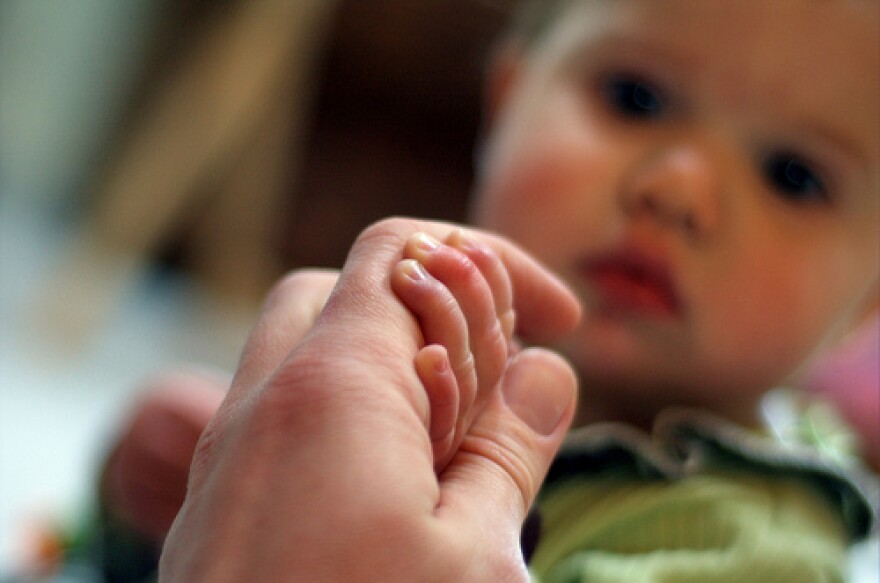Today, we’re going to dive into the bureaucracy.
This is the story of a state program that’s improved the lives of children in Michigan, and why that program is ending – at least for now.
The story starts with a woman we're calling "Mary."
Mary’s husband brutally abused her for years.
A little over a year ago, she found the courage to escape. Her husband is behind bars, but she still fears what might happen if he ever gets out, so we’re not using her real name, or the names of her children.
After her husband went to prison, a new problem came up. Mary’s children had emotional issues. Her 4-year-old son was always angry.
"He would hit me, he would yell at me, he would spit at me," Mary says. "I mean, just, I couldn’t control him, I couldn’t."
Then Sarah Sak came along. Sak is a social worker and a therapist at Bethany Christian Services in Grand Rapids. Sak says Mary’s children blamed their mom for making their Dad go away. And for her son, the only way he ever learned to let people know he was upset was to hit. So Sak tried to redirect that anger
"It was a lot of, 'We’re going to squeeze teddy bears.'" Sak says. "And he’ll tell you, 'I being good, I being good.' And I ask him, 'Well, what does being good mean?' 'I use my words.' That was a lot of work."
Mary says it paid off. Her son doesn’t hit anymore. He doesn’t even take his anger out on the teddy bear.
"He’ll just tell me, 'Mommy, I’m angry. Leave me alone right now.'" Mary says. "And we’ll give him his space. And five minutes, 10 minutes later he comes out, and he’s fine."
Sak says this change will have implications years down the road for Mary’s son, and the rest of society. A lot of the work Sak does is with teenagers in gangs. And she says anger issues are at the root of a lot of these kids’ problems.
So by dealing with the issues early on, you prevent a lot of damaging and expensive future problems for the community.
That’s the whole point of the state-funded project that paid for Sak to do her work with Mary’s family. It was called the Prevention Pilot Project and it used federal grant money to pay for programs at 11 social service agencies in Wayne, Oakland, Genesee and Kent Counties.
The programs offered home visits, counseling and education to keep at-risk families from becoming essentially, part of the system – in foster care, or abuse cases or the juvenile justice system.
Everyone I talked to about this project says it’s been a big success.
"We like a lot of what we’re seeing here," says Michigan Department of Human Services spokesman Dave Akerly.
Part of what DHS likes is the project reduced caseloads for Child Protective Services. More than 95 percent of the families who went through the prevention program didn’t get another visit from CPS. For the entire community, when one of the prevention programs was in place, fewer low-level cases escalated into high-level cases of abuse.
And since that kept more kids out of foster care, the state saved money.
So, what’s the problem? The problem is all of this was funded with federal grant money. And that money is going away.
“The pilot program will end on September 30th," Akerly says.
That news isn’t exactly a surprise for the 11 agencies that have been doing the prevention work.
"We always knew that this specific grant would end," says Cathy Weissenborn of CARE House of Oakland County. CARE House offered parenting classes as part of the prevention project. Weissenborn wants those classes to continue, so CARE House – just like the other 10 agencies in the pilot project – is looking for new funding.
"So we are working on that," Weissenborn says. "I don’t have that today."
This is one of the core challenges of trying to help families that are at-risk.
Money comes. Money goes. Funding for prevention programs is often the least stable, because it’s dealing with problems before they’re really problems.
The thing is if the money is spent early, it should cost less over the long term.
That’s why Dave Akerly says the Department of Human Services isn’t giving up on the pilot project.
"We think this is important," he says. "We think prevention is very important. But funding is important too. And to get that we’re going to have to make a good case."
Over the next year, Akerly says the Department hopes to dive into the numbers more, figure out which specific programs worked best, and then come back to the legislature to make the case to replace the temporary federal money with long-term funding from the state.



